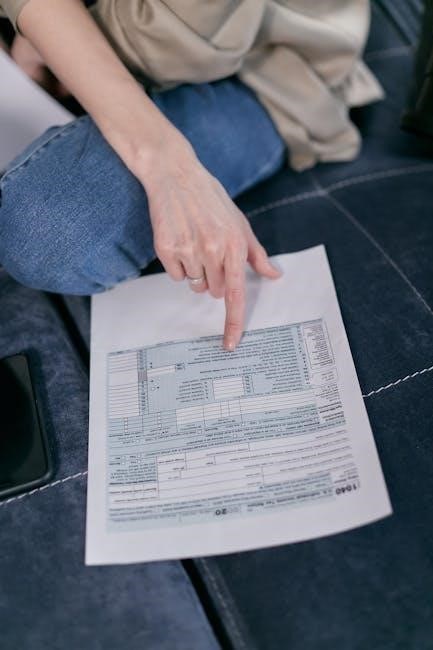Overview of RI-1120C Instructions 2022
The RI-1120C Instructions 2022 guide provides a comprehensive overview for Rhode Island business corporations to report income‚ gains‚ deductions‚ and credits‚ with updated electronic filing requirements and detailed tax administration support.
1.1 Purpose and Scope of the Form
The RI-1120C form is designed for Rhode Island business corporations to report income‚ gains‚ deductions‚ and credits. It ensures compliance with state tax laws‚ covering corporate income tax liability. The form applies to C-corporations‚ including those filing combined or consolidated returns. It also addresses electronic filing requirements and mandatory tax payments‚ providing clear guidelines for accurate tax reporting and administration.
1.2 Key Changes for Tax Year 2022
The 2022 RI-1120C Instructions introduced mandatory electronic filing for large businesses and updated tax credit provisions. Changes included new filing deadlines‚ revised income reporting requirements‚ and expanded electronic payment options. Additionally‚ the form now requires detailed disclosures for combined and consolidated returns‚ ensuring compliance with updated state tax regulations and administrative procedures for accurate tax reporting.

Eligibility and Filing Requirements
The RI-1120C is for Rhode Island business corporations‚ including C corporations‚ S corporations‚ and LLCs electing corporate tax status. Filing is mandatory for entities with state tax obligations.
2.1 Who Must File RI-1120C
All Rhode Island business corporations‚ including C corporations‚ S corporations‚ and LLCs electing corporate tax status‚ must file RI-1120C. This includes entities with state tax obligations‚ combined‚ or consolidated returns.
2.2 Mandatory Electronic Filing Requirements
For tax periods beginning on or after January 1‚ 2023‚ larger business registrants must file returns and remit taxes electronically. This applies to entities with state tax obligations‚ including those filing RI-1120C‚ RI-1120S‚ or RI-1065. Electronic filing ensures accuracy and efficiency‚ aligning with Rhode Island’s modernized tax administration processes.
Key Forms and Schedules
The RI-1120C form is accompanied by essential schedules‚ including the RI-1120C ⎼ CGM Schedule for combined returns‚ ensuring accurate reporting of corporate income and taxes.
3.1 RI-1120C Form Breakdown
The RI-1120C form is a comprehensive document for reporting corporate income‚ deductions‚ and credits. It includes sections for business details‚ income reconciliation‚ and tax liability. Attachments like the RI-1120C ⎼ CGM Schedule are required for combined groups. The form also addresses special filing situations‚ such as short-period returns‚ final returns‚ and amended filings‚ ensuring accurate tax reporting for Rhode Island corporations.
3.2 Associated Schedules and Worksheets
Key schedules include the RI-1120C, CGM Schedule for combined groups and the RI-1120S for S corporations. Worksheets like the Net Operating Loss (NOL) Worksheet and the Business Tax Credits Worksheet are also required. These documents support the main form by providing detailed calculations and additional information‚ ensuring compliance with Rhode Island tax regulations. Mandatory electronic filing applies to larger businesses starting in 2023.

Filing Status and Return Types
The RI-1120C form accommodates various filing statuses‚ including single corporation returns‚ combined returns for affiliated groups‚ and amended or final returns for Dissolution or withdrawal scenarios.
4.1 Single Corporation Return
A single corporation return is for entities filing separately‚ not as part of a combined or consolidated group. This applies to corporations with a calendar or fiscal year. The RI-1120C must be filed by April 15th for calendar-year filers‚ with extensions available. It includes reporting income‚ deductions‚ and credits specific to the corporation‚ excluding group affiliations.
4.2 Combined and Consolidated Returns
Combined and consolidated returns allow multiple corporations to file together under specific conditions. A combined return includes corporations with common ownership‚ while a consolidated return merges financials into one entity. The RI-1120C form must be marked as a combined or consolidated return‚ with a CGM Schedule listing all included companies. This method simplifies reporting for affiliated businesses‚ ensuring accurate tax liability calculation.
4.3 Amended and Final Returns
An amended return corrects errors or updates information on a previously filed RI-1120C. Final returns are required for corporations dissolving or withdrawing from Rhode Island. Attach the final return to the request form and follow instructions for sections V or VI. Extensions are invalid for final returns‚ ensuring all tax obligations are settled upon cessation of operations in the state.

Filing Deadlines and Extensions
The standard filing deadline for RI-1120C is April 15th for calendar-year corporations. Extensions may be requested for up to six months‚ with the extended deadline being October 15th.
5.1 Standard Filing Deadline
The standard filing deadline for the RI-1120C form is April 15th for corporations operating on a calendar year; This applies to both business corporations and S corporations‚ ensuring timely submission of tax returns to the Rhode Island Division of Taxation.
5.2 Extension of Time to File
Taxpayers can request an automatic six-month extension to file the RI-1120C by submitting Form RI-7004. The extension period typically ends on October 15 for calendar-year filers. Extensions can be filed online or by mail and must include the expected tax payment to avoid penalties. An extension of time to file does not extend the time to pay taxes due.

Calculating Taxable Income
Calculating taxable income involves reporting all business income‚ gains‚ and deductions‚ while adjusting for federal changes and specific Rhode Island tax regulations and exemptions.
6;1 Reporting Income and Gains
Corporations must report all business income‚ including receipts from sales‚ services‚ and capital gains‚ on the RI-1120C form. Income should be calculated in accordance with federal tax rules‚ with adjustments for Rhode Island-specific exemptions and modifications. Ensure accurate reporting of gains from asset sales and other taxable events to determine correct taxable income for state tax purposes.
6.2 Deductions and Adjustments
Corporations can claim deductions for business expenses‚ interest‚ rents‚ and royalties‚ aligning with federal tax rules but adjusting for Rhode Island-specific modifications. Adjustments may include net operating losses‚ depreciation‚ and amortization. Ensure all deductions are properly documented and comply with state regulations. Use Schedule M to report adjustments and ensure accurate calculation of taxable income for the tax year.

Net Operating Loss (NOL) Deductions
Net Operating Loss (NOL) deductions allow corporations to carry forward or back losses to offset taxable income in other years‚ subject to specific limitations and rules.
7.1 NOL Carryforward and Carryback Rules
Under the RI-1120C Instructions 2022‚ corporations can carry forward Net Operating Losses (NOLs) indefinitely‚ while carryback is generally not allowed‚ except for specific cases. The rules apply to both general corporations and special entities like insurance companies or public service corporations‚ ensuring compliance with Rhode Island tax regulations for accurate loss utilization across tax years.
7.2 Limitations on NOL Deductions
The RI-1120C Instructions 2022 specify that Net Operating Loss (NOL) deductions are limited to 80% of taxable income for corporations. Certain exceptions apply‚ such as for insurance companies or public service corporations‚ ensuring compliance with Rhode Island tax laws while balancing loss utilization to prevent excessive tax reductions in a single year.

Tax Credits and Incentives
The RI-1120C Instructions 2022 outline various tax credits and incentives to reduce taxable income‚ including the Research and Development Credit and Historic Preservation Credit‚ supporting Rhode Island businesses.
8.1 Available Tax Credits for 2022
The RI-1120C Instructions 2022 detail several tax credits‚ including the Research and Development Credit‚ Historic Preservation Credit‚ Manufacturing Investment Tax Credit‚ and Rebuild Rhode Island Tax Credit. These credits aim to encourage innovation‚ support economic growth‚ and promote specific industries within Rhode Island. Eligible businesses can claim these credits to reduce their taxable income for the 2022 tax year.
8.2 Claiming and Calculating Credits
To claim tax credits‚ businesses must complete specific forms and worksheets as outlined in the RI-1120C Instructions 2022. Credits are calculated based on eligible activities‚ such as research expenditures or historic preservation efforts. Businesses must attach required documentation to support their claims. Each credit has unique criteria and calculation methods‚ ensuring accurate reporting to maximize tax savings while adhering to Rhode Island tax regulations.
Payment and Refund Options
Businesses can remit taxes electronically or by check‚ with payments due by the filing deadline. Refunds are issued upon accurate filing and completing the refund request form.
9.1 Payment Methods and Due Dates
Payments can be made electronically through the Rhode Island Division of Taxation’s online portal or by mailing a check. The due date for payments is April 15th for calendar-year corporations and the 15th day of the 4th month following the close of fiscal years. Late payments incur interest and penalties‚ calculated from the original due date.
9.2 Refund Request Procedures
To request a refund‚ corporations must submit Form RI-1120C with the appropriate schedules and documentation; Refunds can be claimed within three years from the original due date or the date of overpayment. Include a completed RI-1120C Schedule CGM if applicable. Mail the request to the address listed in the instructions‚ ensuring compliance with all specified requirements and deadlines for processing.

Electronic Filing Requirements
Large business registrants must file electronically for tax periods starting January 1‚ 2023. Use approved software for RI-1120C submissions‚ ensuring timely and accurate processing of returns.
10.1 Mandatory Electronic Filing for Large Businesses
Large business registrants must file RI-1120C returns electronically for tax periods beginning on or after January 1‚ 2023. Use approved software to ensure compliance with formatting and submission requirements. Electronic filing improves accuracy and processing efficiency‚ and failure to comply may result in penalties. Consult the Rhode Island Division of Taxation for specific guidelines and software recommendations.
10.2 Electronic Filing Process and Requirements
To file electronically‚ access the Rhode Island Division of Taxation’s online portal and upload the completed RI-1120C form. Ensure all required schedules and worksheets are attached in the specified format. Payments must be made electronically through secure payment methods. The system validates submissions instantly‚ providing confirmation upon successful filing. Follow the portal’s step-by-step instructions for a seamless process.

Contact Information and Resources
For assistance‚ contact the Rhode Island Division of Taxation at (401) 574-8955 or visit tax.ri.gov. Additional resources and support are available online for accurate tax filing.
11.1 Rhode Island Division of Taxation Contact Details
For inquiries related to the RI-1120C form‚ contact the Rhode Island Division of Taxation at (401) 574-8955. Visit their official website at tax.ri.gov for detailed resources and support. Their office is located at 1 Capitol Hill‚ Providence‚ RI 02908‚ offering assistance with tax-related questions and filings.
11.2 Additional Resources and Support
Additional resources for the RI-1120C form include the official Rhode Island Division of Taxation website‚ which offers detailed guides‚ tax calculators‚ and FAQs. The RI-1120C Instructions 2022 booklet provides comprehensive filing guidance‚ while forms like RI-1120C‚ RI-1120S‚ and RI-1065 are available for download. These resources cover electronic filing‚ tax credits‚ and NOL deductions‚ ensuring accurate and efficient tax preparation.

Penalties and Interest
Unpaid taxes incur 18% annual interest (1.5% monthly). Late filing penalties apply to overdue returns. Interest begins accruing from the original due date of the tax payment.
12.1 Late Filing and Payment Penalties
Failure to file or pay on time results in penalties based on the unpaid amount. A 5% penalty applies to late filing‚ with an additional 0.5% monthly interest on unpaid taxes‚ up to 25%. Interest accrues from the original due date. Late payment penalties increase over time‚ reaching a maximum of 30% after 60 months. Timely filing and payment are crucial to avoid additional charges.
12.2 Interest Calculation and Waiver Criteria
Interest on unpaid taxes is calculated at 18% annually‚ or 1.5% per month‚ beginning from the original due date. Waivers may be granted for reasonable cause or administrative errors. Requests must be submitted in writing‚ explaining the circumstances. Approvals are issued on a case-by-case basis‚ ensuring compliance with Rhode Island tax regulations while addressing unforeseen hardships or procedural mistakes.
